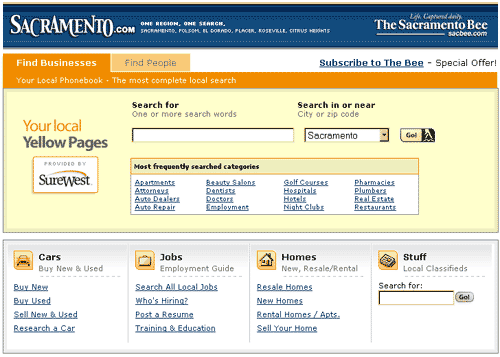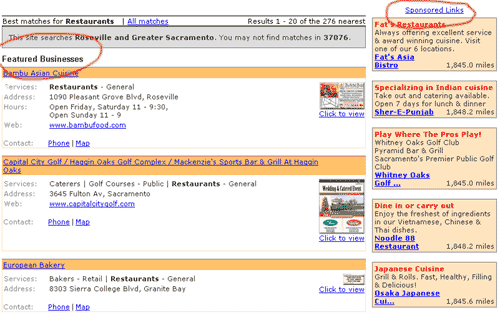 |
→ September 2004 Contents → Column
|
TV News in a Postmodern World: The Value of Local Search
September 2004
|
 |
|
I have a nice balcony/lanai at my second-floor apartment. It's snuggled up next to a giant sycamore tree, and we enjoy being outside.
"No," was her reply, "but it sure does keep my cat in."
This is a lesson in perception. If you're always thinking bugs, a porch screen has but one function. So it is with TV people, I've come to believe.
Item: ESPN.com is running ads touting their new "MyESPN" local pages where you can find everything about your favorite college and pro teams. It's really very cool and designed to not only keep me on ESPN.com, but to take me more deeply inside their site for stories (and those contextual ads based on my zip code).
Item: Google has created a wonderful local search function that allows users to let their mouse do the walking instead of their fingers. It's already pretty good, but it will get better and better. Local search is THE hot thing in terms of advertising.
Item: Topix.net has built an online news aggregator that functions as a local news search engine. The business model is suspect, because RSS can do the same thing without all of the extraneous marketing and links that come with a Web site.
Item: Google is developing a new feature that will allow users to search for audio and video files on the Web. AOL bought Singingfish.com last year to provide the same kind of service. Based on Google's success with local search, one must presume the future ability to search for local news clips in a similar manner.
Item: Print directories, such as the Yellow Pages, see their business models buckling under the weight of online search and are offering their resources to companies who provide them to online publishers in the form of local search.
This is just the beginning, as the world of marketing discovers the efficiency with which the Internet can connect local buyers with local merchants, and it's a huge threat to local content publishers, like television stations.
Most of the people who run local media Internet outlets are either drunk or asleep (or both), and as every day goes by, they abdicate a little more of their piece of the local Internet pie to outsiders. Google hasn't entered the local search business blindly. It sees the handwriting on the wall. Broadcasters can't see it, because, well, they're too busy being broadcasters. They view the porch screen only one way.
The value proposition of any television station is its ability to provide eyeballs for advertising. As that ability diminishes through ever-shrinking ratings, the ad community is responding with an increasingly open mind about alternatives, and the primary one is online. TV's value proposition doesn't work on the Internet, because the medium isn't passive, so in order for a local television station to survive in the not-so-distant future, it must redefine its value proposition to one where the principal purpose is multimedia and interactive. Television is a part of the multimedia future, but it's only one part. So we must begin with a white board session asking three questions:
1. What CAN we do online? 2. How can we make money online? 3. What can we do to help local advertisers online?
According to the Kelsey Group, online directory lookups could surpass print directory lookups within the next three years. And a study by Kelsey and BizRate.com shows about 25 percent of all Web searches are searches for local businesses close to consumers' homes or workplaces. Chuck Davis, President and CEO of BizRate.com said, "Consumers are increasingly using search for shopping related queries. In fact, over a third (36 percent) of all search activity is now shopping-based, defined as using search functionality to look for a merchant, research a purchase or make an online purchase. We expect to see shopping searches continue to increase."
Poynter's Rich Gordon spells out the consequences: "Could local search be as much of a threat to newspapers - and in some advertising categories, local TV - as online classified services have been? I think it's certainly possible. Leaving out classifieds, a newspaper's business model revolves around connecting local buyers to local merchants."
A July 2004 report by Borrell Associates puts it plainly:
"We are strongly encouraging our local media clients to jump on board the Paid Search bandwagon. Options are the Google AdSense or Yahoo! Overture programs; private label vendors such as PlanetDiscover, FindWhat, Interchange, PremierGuide, ApproxiMATCH and Kanoodle; or hedging your bets by creating non-exclusive agreements with multiple partners. Whatever you do, get into the game now.
"... The real action in local search is in getting national advertisers and small service-oriented businesses that don't advertise in newspapers or on TV stations.
"... We are estimating that the Google program (alone) boosts online revenue of newspaper and TV sites by 2 percent to 10 percent."
Meanwhile, a July 2004 report by Nielsen//NetRatings suggests the demand for search advertising is growing far more quickly than the supply of available advertising spots. That'll lead to higher prices, which the report says would mean only the deepest pockets could afford to put their ads near the best keywords.
The resources noted by Borrell all offer simple local search solutions - like the kind employed by the Sacramento Bee in launching sacramento.com this year.
This is a one-stop local search page. The main search is powered by PremierGuide's software using the SureWest print Yellow Pages directory. PremierGuide offers a plug-n-play solution for this, depending on whether it has a business arrangement with a Yellow Pages provider. It allows the Bee to "feature" certain businesses in the rankings (based on what they pay) and sell contextual ads alongside the search results. Here's what a search for "restaurants" produces:
The other niche searches on the main page come from Classified Ventures, LLC, an organization developed in the mid-'90s by newspaper companies to provide online classified services. The automotive search goes through cars.com, the apartment search through apartments.com, and the home search through homefinder.com. Classifieds inputted by The Bee's users wind up on the massive databases maintained by Classified Ventures.
Local TV stations who use, for example, Worldnow to provide their Web sites don't have the luxury of Classified Ventures. Worldnow has cut deals with existing (and well-known) search providers like autotrader.com, match.com, and the Yellow Pages. Searches that begin on the TV station sites go directly to these providers. All these arrangements do is provide them customers. They do nothing for the TV stations except give the appearance of providing a service.
There is no value in hosting a path to somebody else's application without compensation. Moreover, why should a user opt to go through your portal to get to cars.com or apartments.com or match.com when he or she can simply go directly there? Somebody looking for cars, for example, isn't likely to do so simply by being routed through your site. They will go directly to the source, and your arrangement with an auto search provider will have virtually no value to you. All you're doing is providing traffic for the content site.
The same is true with local search. Bringing Google or Yahoo or even that similar to the Sacramento Bee to your Web site provides only a short-term solution. The answer is to build your own local search database and reap the rewards downstream. There are financial gains beyond just advertising that can also be realized. Since the beginning of TV, stations have made commercials for local advertisers, and they need to do the same with Web-based advertising.
In a thoughtful piece on the value of local search, Gus Venditto of InternetNews.com wrote:
The first impact is sure to be Web development for small business. Right now, it's estimated by the Kelsey Group and ConStat's Local Commerce Monitor that only 48 percent of small businesses who advertise have a Web site. Lester Chu, vice president of marketing and strategic planning at Verizon, believes that 60 percent of all businesses don't have a Web site.
Today, many of those Web-unaware businesses are able to keep their online base covered by buying listings through the Yellow Page directories. For a few extra dollars, 1.4 million businesses who advertise in print Yellow Pages have the option of buying online listings that appear at SuperPages, Yahoo and other portals. And if it weren't for Google, all local businesses would compete on a level playing field, because they would all have an equal chance to buy their way into the same online directories.
Google's impact could be seismic because it will rank the pages, and that will re-define the meaning of a good retail location. A small store on a remote side street can build more foot traffic with a good Web site than it could with a busy corner location. All the lower-rent store needs is a better education in the intricacies of search engine rankings.
A smart local TV station will build simple Web sites for local advertisers and host them on their server. This would increase the value of the station's property and cement the relationship with local advertisers. Stations also need to develop rich media ads for their advertisers, but nothing will bring in the revenue like local search. A local merchant directory has unlimited value, but only to the company that owns it.
The days of the monolithic local television station Web site are numbered. They're all built on the portal model, with a home page and links to material deeper within the site. That model is being rewritten by people who don't want to be forced to go here just to get to there. RSS and search are enabling people to have it their way, and who knows what's to come downstream?
News will always have value, but even its value is changing as disruptive innovations permit just about anybody to get into the news business. A television station will always have its place in the media spectrum, but developing an online brand that includes content beyond news and entertainment is the key to downstream profitability.
And it might just keep the bugs out along with keeping the cat in.
© Terry Heaton
|
|
Back to September 2004 Contents
|
|
 Bugs are a problem, though, and I had often thought of putting up screening. However, the floor is slatted, along with the railing, so it wouldn't keep ALL of them out. Several people in the complex had indeed put up screening, so the idea was always on my mind. One day, I walked past one of these apartments, and the lady of the house was on the porch. So I asked, "Does the screening really keep the bugs out?"
Bugs are a problem, though, and I had often thought of putting up screening. However, the floor is slatted, along with the railing, so it wouldn't keep ALL of them out. Several people in the complex had indeed put up screening, so the idea was always on my mind. One day, I walked past one of these apartments, and the lady of the house was on the porch. So I asked, "Does the screening really keep the bugs out?"
